Breakfast is a surprisingly polarizing topic: You either love it or hate it. It's the most important meal of the day or there's nothing special about it.
In the ever-changing world of nutrition, the debate over the morning meal just won’t go away. My take: Not only should you not skip breakfast, you should make it the largest meal of the day.
Multiple studies show the benefits of making breakfast a part of your daily diet routine and the pitfalls of skipping it. A 2017 study in the Journal of the American College of Cardiology followed female volunteers and found that those who skipped breakfast had a higher degree of hardening of the arteries, or atherosclerosis.
Another large study found that individuals who made breakfast the largest meal of the day were more likely to lose weight than those who made lunch or dinner their largest meals. This validated other large studies that showed that a big breakfast helps keep the pounds off over time. Finally, a study in type 2 diabetics found that a large breakfast containing protein helped in the management of type 2 diabetes.
A carbo-loaded breakfast may be keeping you overweight and hungry.
The standard American diet — or "SAD," which it truly is sometimes — is not the best example of what constitutes a healthy breakfast. That’s because the majority of Americans are chowing down on processed meat packed into biscuits, huge bagels smeared with jelly and sugary pastries or cereals. They are also downing it all with a big glass of orange juice.
These options may be the worst things to choose first thing in the morning. High carbohydrate foods lead to massive fluctuations in blood sugar and insulin, creating an energy high, followed by a crash that ultimately leaves you hungry, and searching for, you guessed it, more low-quality carbohydrates.
The reason for this is that the breakfast carbs provided in most American diets is pure sugar. On average a sugar-laden cereal will cost you about 14 grams of sugar, and a doughnut will cost you at least 22 grams or more. Given that the upper limit for a woman is 25 grams a day, most breakfast choices may put you well over the edge for sugar before 8:00 a.m. That’s not a good thing if you want to lose weight, or maintain a healthy weight.
Choose protein at breakfast.
One thing does seem certain: Protein at breakfast may benefit you, and your waistline, all day long by reducing cravings and hunger. A 2015 study found that a 35-gram, high-protein breakfast led to eating less calories the rest of the day, more stable glucose levels and reduced hunger. It also led to less weight gain over time.
Another study found that consuming a high-protein breakfast prevented cravings (especially cravings from sweets) later in the day. On the flip side, individuals in the study who opted against eating breakfast were found to have heightened cravings.
Take your morning run on an empty stomach.
Perhaps the greatest debate surrounding breakfast involves the theory that working out on an empty stomach provides a competitive edge in fat burning. Here’s why: There’s a hierarchy in how the body finds energy for everyday tasks. Glucose, obtained by carbohydrates is the most easily absorbed, and readily available fuel, and takes on center stage when you need energy of any kind. Once glucose (and glycogen) is depleted, the body will search for the next source ready to provide fuel — and that’s fat. Thus, the theory goes that when working out on an empty stomach, the body has to burn fat first due to a lack of available fuel from glucose.
A 2017 study found that exercising in a fasting state may in fact burn more fat. Other studies have showed similar results, including one study that demonstrated a 20 percent increase in fat burning potential when participants exercised without breakfast beforehand. Earlier studies however have refuted the theory that a workout is better when the stomach is empty.
More research is needed to determine the final say on this issue. In the meantime, I tell my patients to do what feels right. If working out seems near impossible without anything in your stomach in the morning, then you may want to have something small, like half of a banana and natural peanut butter.
There is a perfect breakfast. Here is what it looks like.
A new study indicated that individuals' weight-loss success was not necessarily linked to whether their diet was low-carb, low-fat, or even low-calorie but rather whether the individual ate a whole foods, minimal sugar diet. This is perhaps the first approach you should be taking when it comes to breakfast: Eat food, not manufactured calories. That means you should start by avoiding foods with added colors and flavors. Steer clear of foods that have massive amounts of added sugar or reach you via your car window.
Instead, aim for at least 15 grams of protein or more by consuming plain yogurt, eggs, zucchini muffins, quiche cups or a protein smoothie. Make your carbohydrate options complex ones, such as steel-cut oatmeal with mixed nuts and cinnamon or whole-grain sprouted bread with avocado or nut butter and above all, eat breakfast like a king, and decrease meal size as the day progresses.
Listen to your body, and don’t force breakfast if you lack any hint of hunger. I was wrong in telling my patients in my fresh out of school days to eat within an hour of waking. Your body will tell you when it’s time to eat, and when it’s time to stop eating. Listen to it.
Kristin Kirkpatrick, MS, R.D., is the manager of wellness nutrition services at the Cleveland Clinic Wellness Institute in Cleveland, Ohio, and the author of "Skinny Liver." Follow her on Twitter @KristinKirkpat. For more diet and fitness advice, sign up for our One Small Thing newsletter.

